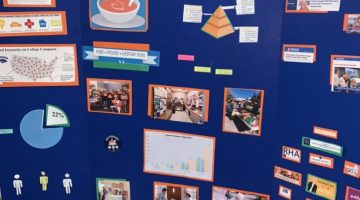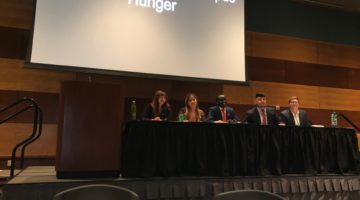
Madeline Purdue/Nevada Sagebrush
Stacks of cereal bowls line the shelves in the Pack Provisions office on Monday, Oct. 31. Pack Provisions helps those in need at the University of Nevada, Reno, receive food.
The rate of college students who can’t afford to live beyond their basic necessities and who go long periods without eating anything at all is increasing. Success in classwork and academics is very difficult for students who battle food insecurity. A resource at the University of Nevada, Reno, aims to help students focus on their classes rather than where to get their next meal.
Pack Provisions is a resource at UNR that provides food, clothing and everyday items to students and staff who are not able to afford them on their own.
“Food insecurity is a huge problem on any college campus, but I don’t think people are aware of it or they just write it off as ‘oh, you’re in college, you’re supposed to be poor,’” said Natalie Sekigawa, the director of Pack Provisions. “I think that everyone has the right to eat, and it affects your schooling so much. How can you focus on school if you’re hungry or you do not know where your next meal is coming from?”
Four college-based organizations, the College and University Food Bank Alliance, the National Student Campaign Against Hunger and Homelessness, the Student Government Resource Center, and the Student Public Interest Research Groups
surveyed 3,765 students across 12 states, attending eight community colleges and 26 four-year colleges and universities, and found 48 percent of students reported food insecurity in the previous 30 days.
The United States Education Department reported that research found “students experience significant academic, social and socio-emotional challenges, and that being homeless is associated with lower school achievement and increased risk of dropping out of school.”
Nico Colombant is a co-founder of Our Town Reno, an organization dedicated to telling the stories of the homeless population in Reno.
“The homeless youth population is definitely a hidden population,” Colombant said. “I’ve noticed on-campus students that I do believe could be homeless, sometimes you see them sleeping in buildings.”
According to Pack Provision’s 2015-16 Wolf Pack Civic Community Assessment, 60 percent of students who took the poll indicated they experienced food insecurity last spring semester. Of those, 30 percent said they experienced food insecurity frequently. An additional 30 percent said they experience food insecurity sometimes or often.
“[They’re] not at the highest level, but they might have to skip a meal here and there or not eat for a week while waiting for their next paycheck,” Sekigawa said.
Pack Provisions also refers students to resources on campus to help with food insecurity and homelessness, such as the Student Health Center and Counseling Services. The organization also educates students about off-campus resources, such as St. Vincent’s Food Pantry, the largest food distribution service in northern Nevada.
“I don’t think there should be a stigma because if professors or fellow students were to know about the situation, I think more than not people would want to help,” Colombant said. “I think it is a growing population, and I think we should all work to end the stigma because it makes it hard for students to be able to do their work.”
In order to receive help from Pack Provisions, students or staff must fill out a form and bring it during office hours. The resource is located on the third floor of the Joe Crowley Student Union and also takes appointments.
“Just because you do not see it doesn’t mean it isn’t apparent or it isn’t here,” said Sekigawa.












